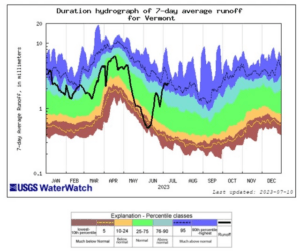Organic Advocacy in Action: Reflections on NSAC Lobby Day
By Annika LaFave, OFRF Policy and Communications Intern

OFRF Policy & Communications Intern, Annika LaFave in front of the capitol after 8 official meetings during NSAC’s annual lobby day, and a “meet and greet” coffee chat.
Earlier this month, I had the exciting opportunity to participate in the National Sustainable Agriculture Coalition (NSAC) Lobby Day with Gordon (OFRF’s Policy & Programs Manager). As the Policy and Communications intern for the Organic Farming Research Foundation and a recent newcomer to national agriculture advocacy, I have gained a deeper understanding of the Farm Bill and Appropriations processes and still have more to learn.
Our lobby day goals were to discuss the significance of the organic industry and how legislation like the Strengthening Organic Agriculture Research Act (SOAR Act), Organic Research and Science Investment Act (OSRI Act), Continuous Improvement & Accountability in Organic Standards (CIAO), and Opportunities in Organic Act can address common challenges organic producers face. As anticipated, the lobby day underscored the vital role advocates play in conveying farmers’ needs to lawmakers.
Appreciating the intricacies of sustainable agriculture and the barriers farmers face requires a personal connection or lived experience. I was reassured to learn that many congressional agriculture committee staffers seem to “get it” and even have ties to farming in their backgrounds. It is reassuring to know that even with the appearance of continued inaction, there are internal agriculture champions working to help bridge the gap where lawmakers lack such a connection. One thing that stood out to me was the level of transparency staffers had when speaking about the status of the upcoming (delayed) Farm Bill and Appropriations negotiations.
Unifying Nature of Agriculture and Food
In a tumultuous global landscape grappling with climate change, social inequities, and political unrest, we all share a collective need for safe and reliable healthy food access. In this lies a belief widely held by many farmers and consumers regardless of party affiliation: a resilient food system is one that values conservation, ecologically-sound practices, human and animal welfare, and equitable access to basic needs. In most of our eight meetings with congressional staffers from both political parties, there was consensus that the needs of our vulnerable farms and food systems must be addressed. For me, these earnest interactions confirmed that sustainable agriculture, encompassing organic and regenerative practices, seems to have recognition as a nonpartisan bright spot in a difficult Congress.
Prioritizing Farmer-Driven Research Through Legislation
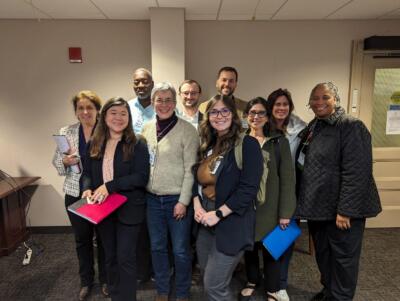
During the lobby day, OFRF staff and members of NSAC met with Leslie Deavers, Chief of Staff to the Associate Chief and Rebekah Lauster, Chief of Staff for the Office of the Regional Conservationists to discuss NRCS’ strategies on field staff recruitment and retention. OFRF is proud to be able to work with these partners to ensure high quality services for farmers.
A recurring topic of conversation in our meetings was how organic agriculture research overlaps with the needs of nonorganic producers. If we relate food systems policy initiatives to formative research principles and human-centered design, it’s clear that research objectives and dissemination methods should explicitly fit the needs and capacity of the “end user”. While trending tech-research exploring artificial intelligence and precision agriculture has the potential to transform our foodscape, it is essential that we recognize the immediate limitations of small and mid-sized producers’ ability to access such technologies. I appreciate the University of South Dakota’s researchers’ policy advice to approach agriculture research with a social justice framework, ensuring that we do not leave behind the farming communities most in need. Amid the complex challenges we face in today’s food system, we must prioritize farmer-centered approaches to address wicked problems.
The research sector represents an ever-important industry whose work directly impacts the economic and working lives of farmers and rural communities. It is essential that investments in agriculture research reflect both the economic and production needs of the farmers it aims to support. One particularly salient issue is the dwindling number of new small and midsize farmers—how can advocates and researchers best meet the needs of smallholder and beginning farmers, and ensure that they have a viable path forward?
81% of BIPOC farmers and 63% of beginning farmers surveyed in OFRF’s 2022 National Organic Research Agenda specified that “managing production costs” is a significant production challenge. Among non-production challenges, “accessing labor” and “finding and developing markets for organic products” were among the top concerns for all surveyed farming demographics. A study from the USDA Economic Research Service (ERS) on the Profit Potential of Certified Organic Field Crop Production and University of Vermont’s study on labor management decisions for small and mid-sized farms are just two examples of how federally-funded research can address these key challenges.
Closing Thoughts
Advocating for farmers requires more than rhetoric; it requires tangible action and systemic change. Following the lobby day meetings, I feel inspired to dig deeper into USDA National Agricultural Statistics Service (NASS) local food systems and organic production data as a means of informing my own advocacy work. You can get involved too, simply by calling your Representative and Senators to ask their offices to check in on the status of Organic Research in the upcoming Farm Bill and Appropriations negotiations. You can find their contact info here! Small actions by many people are what make this work possible. And if you’re interested in getting more involved, reach out to Gordon at gordon@ofrf.org!




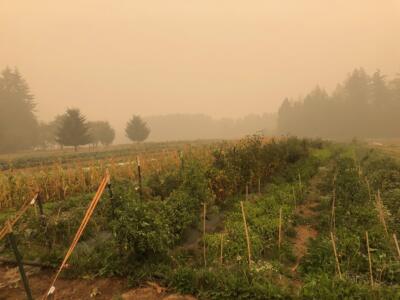
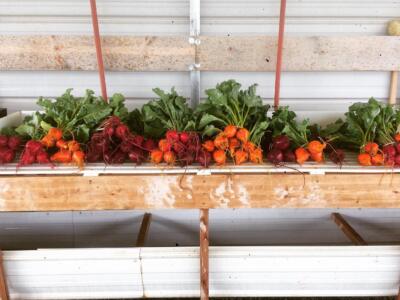 The first step toward promoting a healthier, more sustainable food system is ensuring federal and state governments support farm workers and local agricultural markets. Policymakers rely on researchers to demonstrate quantifiable issues within our food system and tangible opportunities to solve them. Only with this evidence, can advocates and policymakers demonstrate a critical need and rally support for meaningful policy development. Additionally, research can provide much needed technical and economic support for farmers to help improve their growing practices, increase yields, and make farming as profitable as it can be in light of the many barriers they face. In
The first step toward promoting a healthier, more sustainable food system is ensuring federal and state governments support farm workers and local agricultural markets. Policymakers rely on researchers to demonstrate quantifiable issues within our food system and tangible opportunities to solve them. Only with this evidence, can advocates and policymakers demonstrate a critical need and rally support for meaningful policy development. Additionally, research can provide much needed technical and economic support for farmers to help improve their growing practices, increase yields, and make farming as profitable as it can be in light of the many barriers they face. In  OFRF is also excited to be part of USDA’s
OFRF is also excited to be part of USDA’s 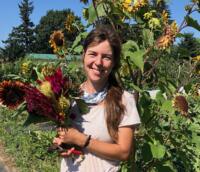
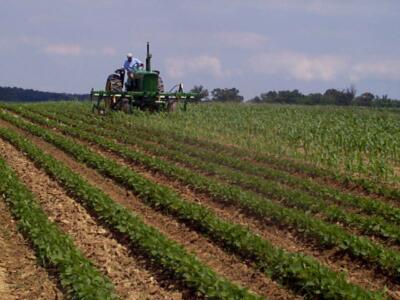

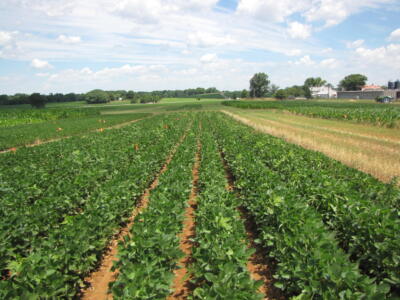
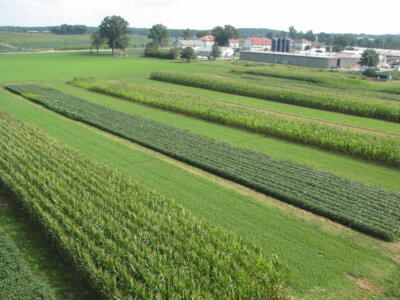
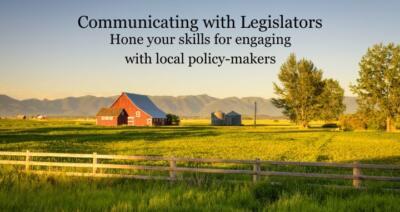
 For government funding, or appropriations, neither chamber has successfully passed all twelve of the necessary spending bills on the floor, which means much of the limited floor time for the rest of the year will be spent on both a continuing resolution and then hopefully passing full funding bills before the end of the year. But, that would mean the other expiring piece of legislation, the Farm Bill, would also need an extension. This is all-but guaranteed with the amount of work needed to bridge the yawning gap between the Senate and House spending bills. Some predict that the Farm Bill will be extended until the spring of 2024, some until after the elections in 2024.
For government funding, or appropriations, neither chamber has successfully passed all twelve of the necessary spending bills on the floor, which means much of the limited floor time for the rest of the year will be spent on both a continuing resolution and then hopefully passing full funding bills before the end of the year. But, that would mean the other expiring piece of legislation, the Farm Bill, would also need an extension. This is all-but guaranteed with the amount of work needed to bridge the yawning gap between the Senate and House spending bills. Some predict that the Farm Bill will be extended until the spring of 2024, some until after the elections in 2024.


